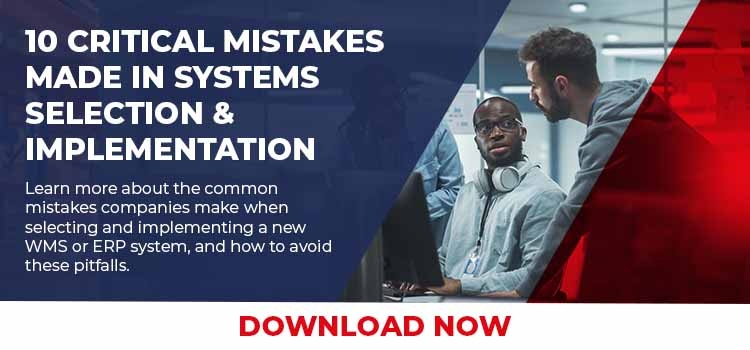Last week we sent a Request for Information (RFI) for budgetary pricing to three ERP system vendors that we felt best fit our client’s business. We laid out the schedule for how the client expected the system selection to proceed. This list of tasks included sending a Request for Proposal (RFP), analyzing the responses and on-site demonstrations of the software. For some context, the client has sales of $13 million and a budget of $500,000 to implement.
One vendor fired back an arrogant email that said they felt their systems capabilities were superior. Sales were exceptional this year. They no longer feel they needed to answer Requests for Proposals (RFP). They would not be doing on-site demos (so that meant they would not see the contact centers or the fulfillment operation). Only in “special cases” would they do so.
What client’s requirements aren’t “special”, or unique? In this case, the omnichannel client has several small footprint specialty stores selling color/size apparel, a catalog and e-commerce site. By the nature of being a small company and color/size assortments, there isn’t necessarily large quantities of products in the stores or warehouse.
The client expects the store and DC inventory system to be fully integrated so that on-line inventory across locations (stores or DC) accurately reflect actual floor inventory availability -- on-line from the stores’ sales, contact center or e-commerce site. Occasionally customers’ direct orders are filled at the store level so access and update capabilities from the stores is critical, too.
Without an RFP and on-site demonstrations, it would be extremely difficult to understand the differences between new systems, and whether a potential new system is materially better than the existing system.
Scratch that vendor off the client’s list.
The importance of RFPs to the selection process is equally critical for any large scale system: order management, warehouse management, web platform, content management system, warehouse automation system, etc.
Let’s look at the potential ramifications for not having on-site demonstrations.
Web based demos generally aren’t not long enough or effective enough to see all the functionality. Rather than a web based demo, we advise you spend 1.0 to 1.5 days minimum looking at every aspect, and to schedule your various department managers into system functions affecting their responsibilities.
Back to our client with a $500,000 budget. That's a huge investment for a small company, but their system is now 15 years old. The owners rightfully want to be sure that the final selection is the right one, down to the last detail. They also want a total cost of ownership for the licenses, software, hardware, modifications, annual support, etc. If the vendor isn't willing to spend the time on-site with you, you will never understand how the system is designed and how good the fit will be for your company, or what modifications might exist.
A vendor needs to see your contact center and fulfillment operations. A picture is worth 10,000 words. Experienced vendors often add great insight to the changes that their system will bring to your business environment, but also can tell you what changes will be required to take best advantage of their system.
5 Reasons RFPs Are Critical to Your ERP System Search and Selection
1. Forces You to Define Requirements
The Request for Proposal writing process is an internal exercise and discipline for your company to identify what your information systems requirements and needs for the new system are in detail. It is also the best way for you to get on the same page and get buy-in between departments in your company.
2. Allows for comparison of one system to another
In analyzing vendor responses, the RFP's questions and responses becomes the basis for detail comparison in terms of functions, detail investment, vendor implementation methodology, etc. In the case of ERPs sold by Value Added Resellers (VAR), comparison between VARs the RFP should uncover key services and experience of the VARs to make sure they are the right fit for your company. VARs can often work in different industry segments. What is their omnichannel experience and how can it benefit our omnichannel client discussed above?
3. Gets control of product demonstrations
Ideally, we like our clients to control the demonstrations much more than typically happens. Left to their own devices, vendors talk about how great they are and they show you whiz bang functions. (We know they're good, that’s why we recommended them for the short list.) But what are the functions most crucial to your business and buying a new system? Going back to the retail store and DC inventory integration above, how well do the short list of vendors meet these needs? Focus the demos’ questions and analysis on the key functions.
4. Gets you thinking about Return on Investment
Analyzing functional differences and advantages of one system to another should also get you thinking about how the proposed system will have a return on investment. ROI is often difficult for many companies – vendor or buyer – to show savings. We can always show a long list of intangible benefits. What reduction in costs, increase in productivity or improved customer service can we “take to the bank”?
5. Produces an organized selection methodology
Most systems selection projects have to be scheduled over months rather than days because of team and vendor availability. An organized methodology and RFP process helps you track and compare what your observations, questions and conclusions are.
Using an RFP and this selection process will help you make the “right” application decision for your company. We all know that in complex businesses, no system can answer all the functionality needed. But the RFP and the analysis is critical to understanding the fit.






SHARE